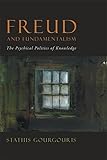Freud and Fundamentalism : The Psychical Politics of Knowledge / ed. by Stathis Gourgouris.
Material type: TextPublisher: New York, NY : Fordham University Press, [2022]Copyright date: ©2010Description: 1 online resource (224 p.)Content type:
TextPublisher: New York, NY : Fordham University Press, [2022]Copyright date: ©2010Description: 1 online resource (224 p.)Content type: - 9780823232246
- 9780823291649
- online - DeGruyter
| Item type | Current library | Call number | URL | Status | Notes | Barcode | |
|---|---|---|---|---|---|---|---|
 eBook
eBook
|
Biblioteca "Angelicum" Pont. Univ. S.Tommaso d'Aquino Nuvola online | online - DeGruyter (Browse shelf(Opens below)) | Online access | Not for loan (Accesso limitato) | Accesso per gli utenti autorizzati / Access for authorized users | (dgr)9780823291649 |
Frontmatter -- Contents -- Introduction -- Modeling Freud and Fundamentalism -- Myth and Dogma in 1920: The Fundamentalist-Modernist Controversy and Freud’s ‘‘Death Drive’’ -- Trees, Pain, and Beyond: Freud on Masochism -- Of Rats and Names -- Mad Country, Mad Psychiatrists: Psychoanalysis and the Balkan Genocide -- Everything You Always Wanted to Know About David Lynch, but Should Be Afraid to Ask Slavoj Žižek -- Fictions of Possession: Psychoanalysis and the Occult -- Religion and the Future of Psychoanalysis -- The Contribution of Psychoanalysis to Understanding the Genesis of Society -- The Hermeneutics of Suspicion Reconsidered -- On the Epistemological Status of Psychoanalysis -- Note -- List of Contributors -- Index
restricted access online access with authorization star
http://purl.org/coar/access_right/c_16ec
At the heart of this volume are questions about the psychic components of the modes of thinking we call “fundamentalist”—that is, thinking that disavows multiplicities of meaning, abhors allegorical elements, and strives toward an exclusionary orthodoxy that codifies not just its own world but that of its adversaries, its others. The essays address transcendentalist orthodoxies of all kinds, whether religious or secularist. Fundamentalist elements in psychoanalysis itself are also placed in question, at the same time as psychoanalytic thinking and practice is explored as a mode of knowledge that ultimately unravels fundamentalist tendencies. The texts in this collection represent a wide array of disciplinary standpoints. Their overall aspiration is to interrogate discourses of orthodoxy, literalism, exclusion, and dogma—that is, discourses obsessed with monolithic (monolingual, monological, monolateral, monomythical, and certainly monotheistic) encounters with the world.
Mode of access: Internet via World Wide Web.
In English.
Description based on online resource; title from PDF title page (publisher's Web site, viewed 03. Jan 2023)


